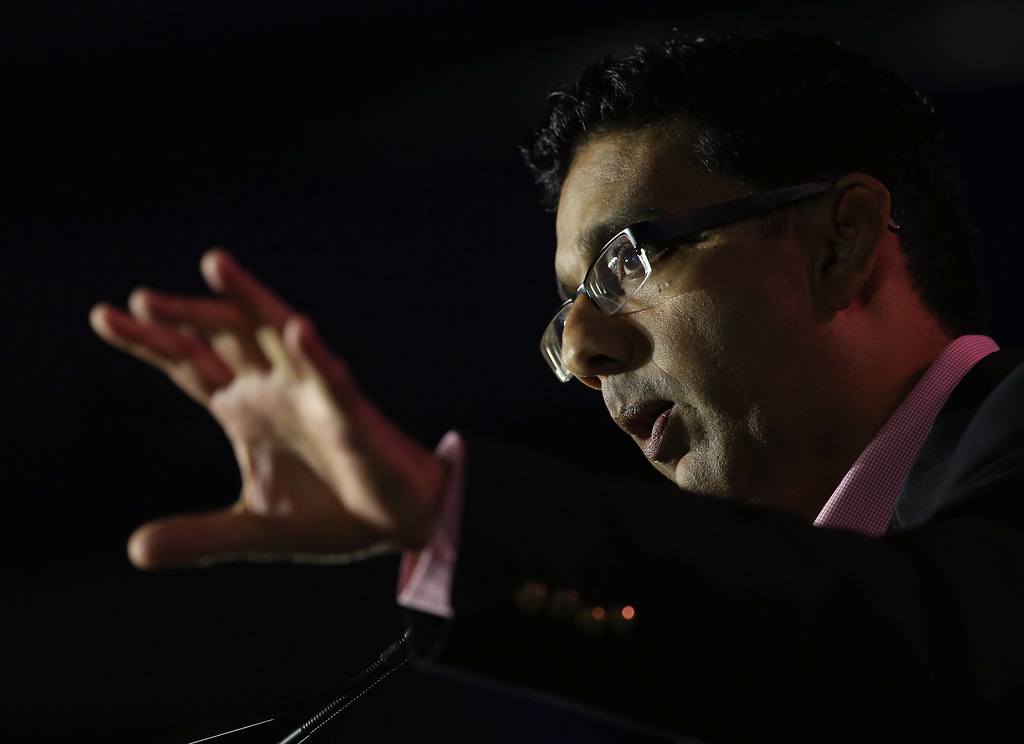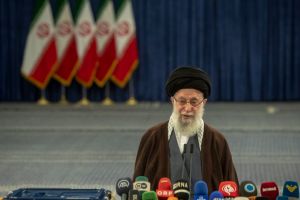When I heard that President Trump had pardoned Dinesh D’Souza, I sought the opinion of an alumnus of the Dartmouth Review who has yet to do a stretch in the big house.
‘His nickname at Dartmouth was ‘Distort D’Newsa’,’ my source whispered, and then hung up before National Review could trace the call.
In 2014, D’Souza pleaded guilty to federal charges that in 2012, he had routed $20,000 through two associates, as funds for his friend Wendy Long’s run for the New York Senate. Long lost the race to the incumbent Democrat, Kirsten Gillibrand. D’Souza denied the charges at first, but then pleaded guilty. The prosecutors added a second charge, making false statements to the government. That raised D’Souza’s potential stretch from two years to seven.
Democrats celebrated when D’Souza was sentenced eight months in a halfway house, though some of them might have felt the judge was too lenient in allowing D’Souza to write during the day. His evenings, though, were his own. Presumably, he spent them as his fellow inmates did, carving shivs with a fork lifted from the kitchens, and administering punishment beatings to liberal Republicans.
‘This is clearly a case of selective prosecution,’ said Alan Dershowitz, who is not and has never been a Republican. Of course, D’Souza broke the law. But when everyone is breaking the law—and when it comes to campaign finance, that is not an implausible generalization—the government must use its discretion when identifying which cases should be prosecuted.
The $20,000 in D’Souza’s scheme is piffling when compared to the $1.9m irregular contributions that the 2008 Obama either failed to disclose or improperly disclosed. The fine paid by the Obama campaign, $375,000, was less than D’Souza’s $500,000 bail. And while D’Souza’s donations were wasted, the Obama campaign’s paid off.
It is hard not to conclude that Eric Holder and the Justice Department selected D’Souza for prosecution because of D’Souza’s attacks on President Obama. In The Roots of Obama’s Rage(2010) and the film adaptation 2016: Obama’s America, D’Souza theorised that Obama really had got his dreams from his father, and that the Obama presidency was cryptically Marxist, anti-colonialist, anti-American and anti-Western.
All good knockabout stuff. So why the pardon? This morning, the Trumpologists had three theories. The first is that Trump is determined to erase the infamy of the Obama administration, and that there’s no point in having power if you can’t also be arbitrary. He sees politics as a rigged partisan game, and it’s his turn to play.
Many commentators, not all of them Democrats, ridiculed D’Souza’s psychoanalyzing of Barack Obama. This has not stopped them from advancing an equally speculative theory about Trump’s psychology.
The second theory is that Trump is responding to the outcry from D’Souza and his friends, after the New York Post’s revelation earlier this month that Rosie O’Donnell, also not a Republican, had exceeded the $2,700 limit in donations to at least five Democratic candidates, and apparently by using different addresses and bank accounts.
‘I was not choosing to over-donate,’ said O’Donnell, like the born comedian she is. ‘I just donate assuming they do not accept what is over the limit.’
O’Donnell is not being prosecuted. Trump has tweeted that D’Souza was ‘treated very unfairly by our government’. Perhaps he feels that the unfairness of O’Donnell not being prosecuted is equal to the unfairness of D’Souza’s conviction. Perhaps this theory also depends on speculative psychology, in this case the belief that Donald Trump listens to other people and reads the New York Post.
Or perhaps Trump wants to send a message to anyone caught in Robert Mueller’s dragnet. That message, familiar to habitués of the jail house, is that those who don’t rat out the Don can expect a pardon down the line.
This third theory derives from the most theoretically complex school of Trumpology. This theory holds that, though the president shoots from the hip like a gunfighter with dysentery, he never forgets his long-term goals. Trump, like the youthful ‘Distort D’Newsa’, advances by indirection and distraction—like Sun Tzu, but with a draft deferment in one hand and a cheeseburger in the other.
For evidence to support this theory, consider the Tale of Three Kims. While Mike Pompeo and Kim Jong Un’s emissary Kim Yong-chol are engaged in negotiations that may well lead nowhere, the media are distracted by Trump’s consultations on prison reform with Kim Kardashian.
I like this theory, because it suggests that at least someone knows what’s going on in the White House. The next question is, will Dinesh D’Souza donate, though not, of course, above the legal limit, to the West-Kardashian 2024 campaign?


















